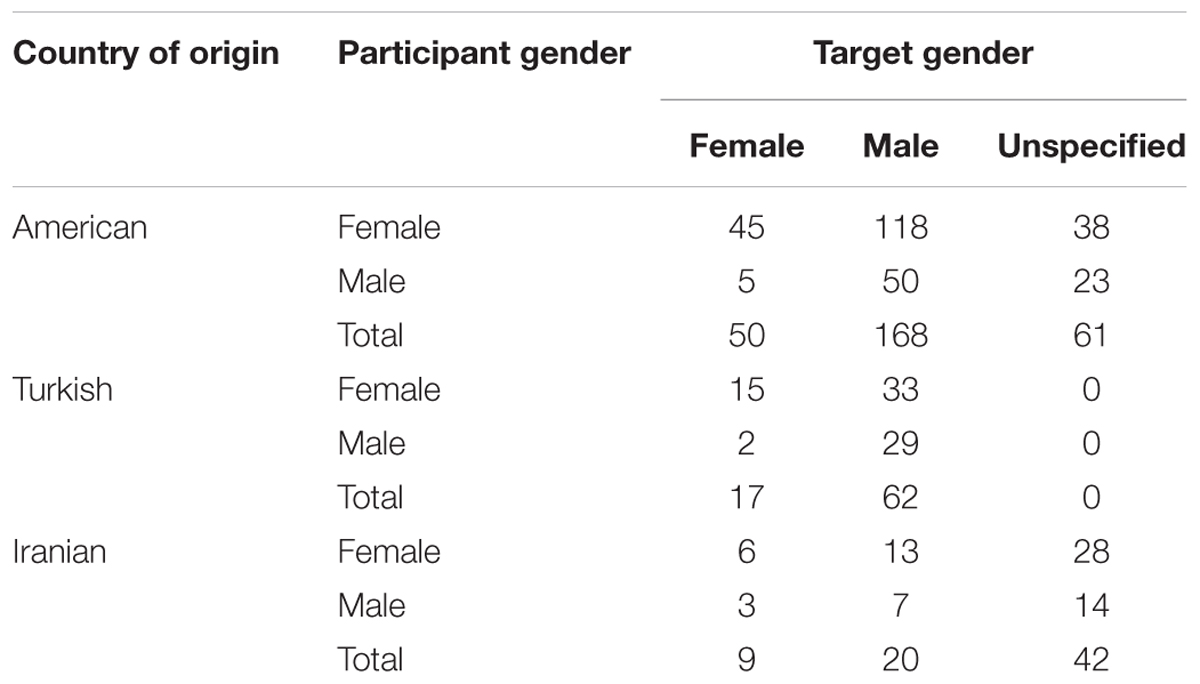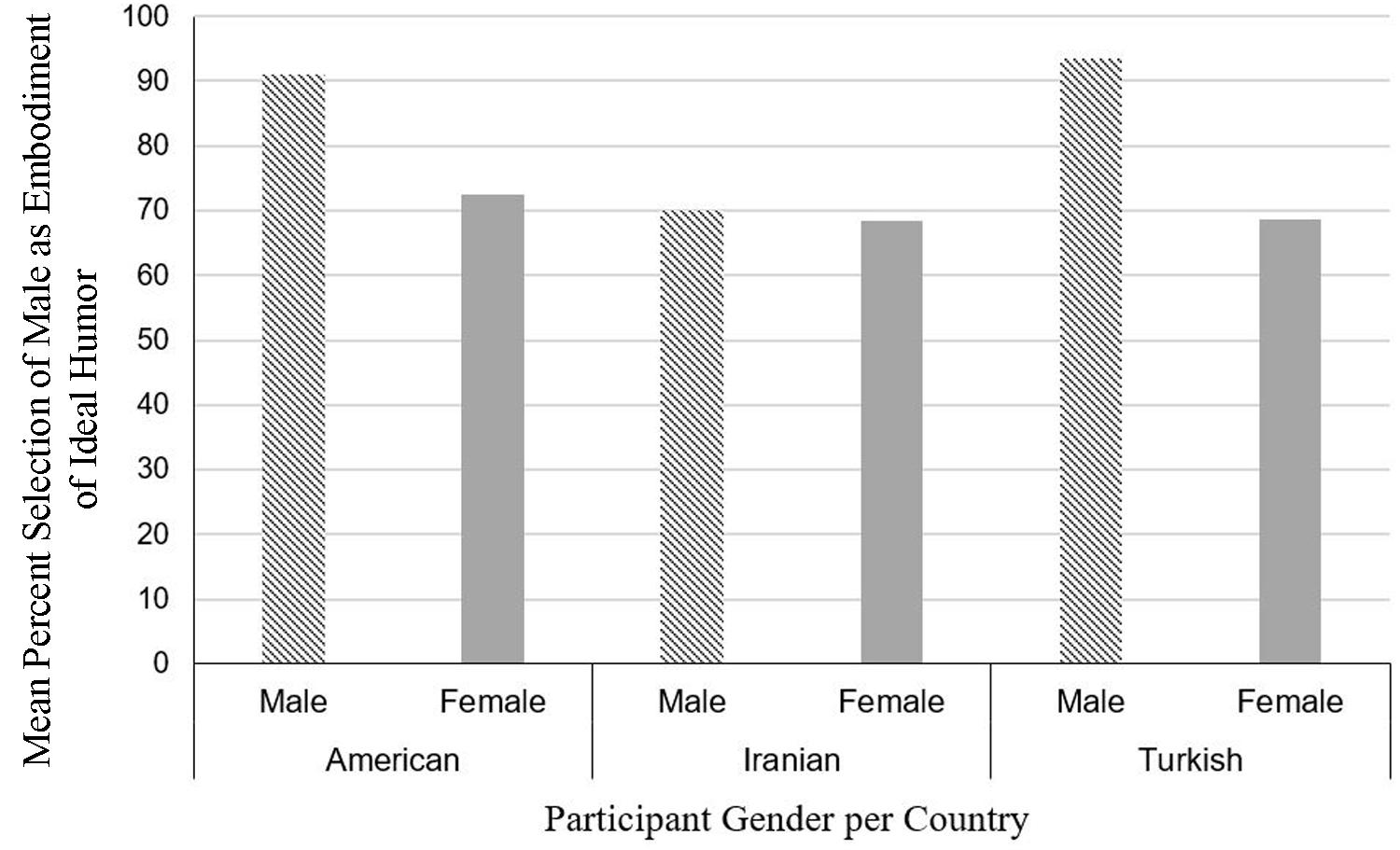To explore lay conceptions of characteristics of an ideal sense of humor as embodied in a known individual, our study examined elicited written narratives by male and female participants from three different countries of origin: United States, Iran, and Turkey.
As reported in an earlier previous study with United States-based participants (Crawford and Gressley, 1991), our study also found that the embodiment of an ideal sense of humor was predominantly a male figure. This effect was more pronounced for male than for female participants but did not differ by country. Relative mention of specific humor characteristics differed by participant gender and by country of origin.
There is an established literature on gender differences in humor perception and humor styles. Men have been noted to prefer humor that has sexual or aggressive themes whereas women appear to prefer neutral or absurd humor (Aillaud and Piolat, 2012). Whereas earlier studies showed that sexist humor (i.e., humor that upholds gender role stereotypes) is preferred over non-sexist humor (Cantor, 1976), other studies report that both men and women prefer humor that has the opposite gender as the butt (Vaid and Hull, 1998; Parekh, 1999).
Furthermore, men typically rate themselves higher than women in humor initiation whereas women tend to rate themselves higher in humor appreciation, but when humor is studied in actual conversational contexts a more nuanced picture emerges (see Kramarae, 1981; Kotthoff, 1996, 2000; Schiau, 2017). Similarly, whereas some studies have found that humor produced by men is judged to be more humorous than that produced by women (Brodzinsky and Rubien, 1976), other studies have not found this effect (Hull et al., 2017), and still other work suggests a bias operating, whereby men are perceived to be the “funnier sex†regardless of how their humorous creations are actually judged (Mickes et al., 2011; Hooper et al., 2016).
As an extension of our interest in gender and cultural dimensions of humor, the aim of the present research was to characterize how gender and country of origin (as a proxy for culture) may shape how individuals conceptualize an ideal sense of humor. The motivation for this study was a previous study which examined the role of gender in lay conceptions of an ideal sense of humor (Crawford and Gressley, 1991) in a large sample of United States-based participants of different ages and backgrounds. Participants in this study were asked to provide a brief narrative describing the humor characteristics of a person they knew who embodied an outstanding sense of humor.
Crawford and Gressley (1991) reported that a majority of the participants identified a male figure as the person who embodied an outstanding sense of humor. Indeed, of the 141 respondents (49 men, 92 women), nearly 84% of men and 67% of women selected a male figure. The researchers also classified the humor characteristics mentioned into five categories: creativity (witty, clever, quick comeback), caring (humor used to put others at ease), real life (grounding the humor in real life experiences), jokes (having a repertoire of jokes), and hostility/sarcasm (satirical, biting humor) and noted that
creativity, caring and real life were mentioned most often, and that there were no discernible differences in the weighting of these characteristics as a function of either participant gender or target gender.
Over 25 years have passed since the Crawford and Gressley (1991) study. While gender continues to be a salient element structuring society, women have also become more visible in a number of domains of public life, including in the realm of comedy. It is possible that gender stereotypes may have become less entrenched in the present day. We therefore wondered if the preference for a male figure as the embodiment of an outstanding sense of humor noted previously still holds among young adults in the present age. We also wondered whether individuals from other countries would show a similar preference, given that they might be less likely to be influenced by Western gender stereotypes (including stereotypes regarding men as being the canonical humor initiator), but might have their own cultural stereotypes about humor, gender, and the relation between the two.
In searching the literature, we could find only one other empirical study conducted since the study by Crawford and Gressley (1991) that used their open-ended prompt.
This study, by Nevo et al. (2001), was conducted on men and women in Singapore. It, too, found that the embodiment of an outstanding sense of humor was male. Of the 18 men and 46 women in the study, 76% of respondents selected a male target (Nevo et al., 2001). The researchers further noted that the preference for a male target was more pronounced in men, but no additional analyses were reported in terms of specific humor characteristics mentioned by men and women. Thus, we felt another study was warranted.
Most of the data were coded by the same researcher (with gender of participants masked) to provide consistency in coding. A subset of the data were also intercoded to ensure some level of consensus (at least 80%). The five coding categories were as follows: Creativity: This characteristic includes terms referring to creative aspects of humor, like witty, quick comeback, playing with language, clever, as well as being spontaneous or natural. An example of this characteristic from our sample is “very quick in answering with a witty comment.†Caring: This characteristic indicates the kind of humor that makes people laugh and helps to change their mood when they are upset or in a tough situation. An example of this characteristic is “their humor helps relieve the tension.†Real Life: This characteristic shows the ability of the humorous person to tell stories and recount real life events in a humorous way. An example of this dimension is “a great story-teller to bring out humor.†Jokes: This characteristic refers to the use of actual jokes. An example of this dimension is “holds the crowd’s attention with a simple joke.†Hostility/Sarcasm: This category consists of attacking, insulting, and destructive humor as well as sarcasm. An indication of this characteristic is “can come up with the worst sexist insult.â€
A chi square analysis was done excluding those whose target gender was unspecified to compare the relative percent mention of a male vs. female humor target, collapsed across participant gender. The analysis showed no significant effect of country of origin, χ2= 0.33, p = 0.85, N = 331. That is, regardless of their country of origin, participants showed a consistent tendency to select a male figure as their humor ideal: 77.1% of Americans, 78.5% of Turkish, and 73.5% of Iranian participants identified a male.
A logistic regression was conducted to see if the gender of the ideal humor target person could be predicted based on the participants’ gender or the participant’s country of origin (American, Turkish, Iranian). Again, only participants whose responses indicated the gender of their humor ideal were included in the analysis. Dummy coding was applied for the analysis. The model was significant, χ2= 13.78, p = 0.003, df = 3 and explained 6.2% of the variance.
Gender of participant was a significant predictor of gender of humor target (χ2= 11.08, p = 0.001, odds ratio = 0.29): male participants were more likely than female participants to select a male target as the embodiment of an ideal sense of humor (89.6% vs. 71.9%, respectively). Country of origin, on the other hand, was not a significant predictor (χ2= 0.32, p = 0.85) (Turkish vs. Iranian: χ2= 0.13, p = 0.71, odds ratio = 1.19; American vs. Iranian: χ2= 0.31, p = 0.57; odds ratio = 0.94; American vs. Turkish: χ2= 0.04, p = 0.84, odds ratio = 0.79). See Figure 1 for a depiction of the percent mention of male targets per participant gender and group.
A logistic regression was conducted on the American sample to see if there was a difference related to time at testing in the percent mention of a male target by men and women. Here, Crawford and Gressley (1991) were compared with data from the American sample (which was collected over two different time periods, 2004 and 2014).
The model was significant, χ2= 14.97, p = 0.002, df = 3 and explained 6.9% of variance. There was not a difference between the American 2014 and the 1991 data. However, the American 2004 data showed a difference than both the 1991 data, χ2= 6.33, p = 0.012, B = -1.12 and the 2014 data, χ2= 4.88, p = 0.027, B = -1.01. Participants from the 2004 sample (89.6%) revealed more male favored results than the 2014 sample (73%) and than the original study sample (73%).
Participants’ gender was also a significant predictor, χ2= 5.29, p = 0.021, B = -0.767. That is, the selection of a male humor ideal was significantly higher when the participant was a male than when the participant was a female. In the original study male participants’ preference for a male target was 83.7% and female participants’ preference for a male target was 67.4%.
In our study, male preference for a male target was 90.9% while female preference for a male target was 72.4%.
Frontiers | Is an Ideal Sense of Humor Gendered? A Cross-National Study | Psychology


